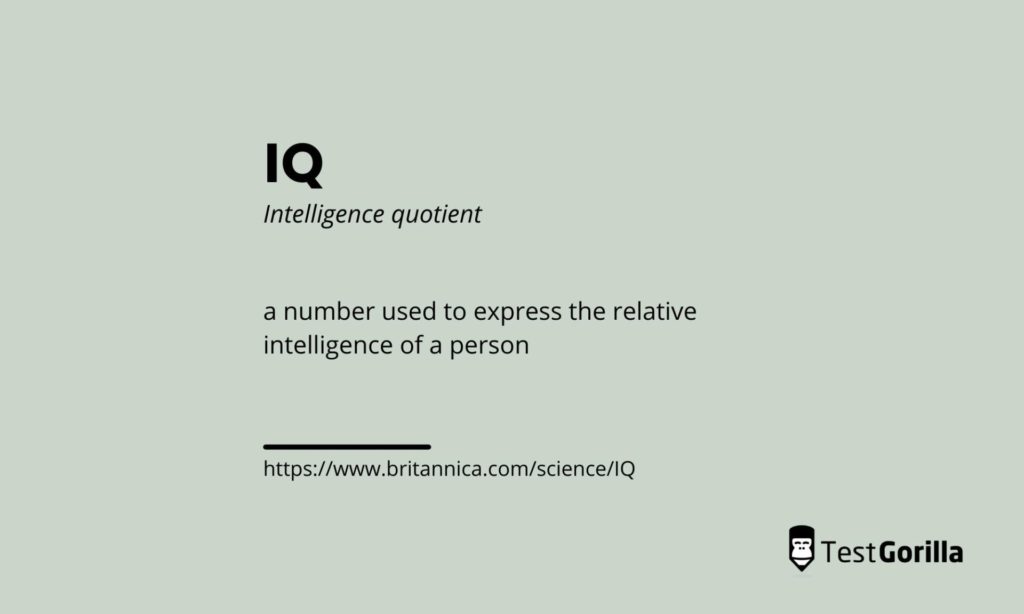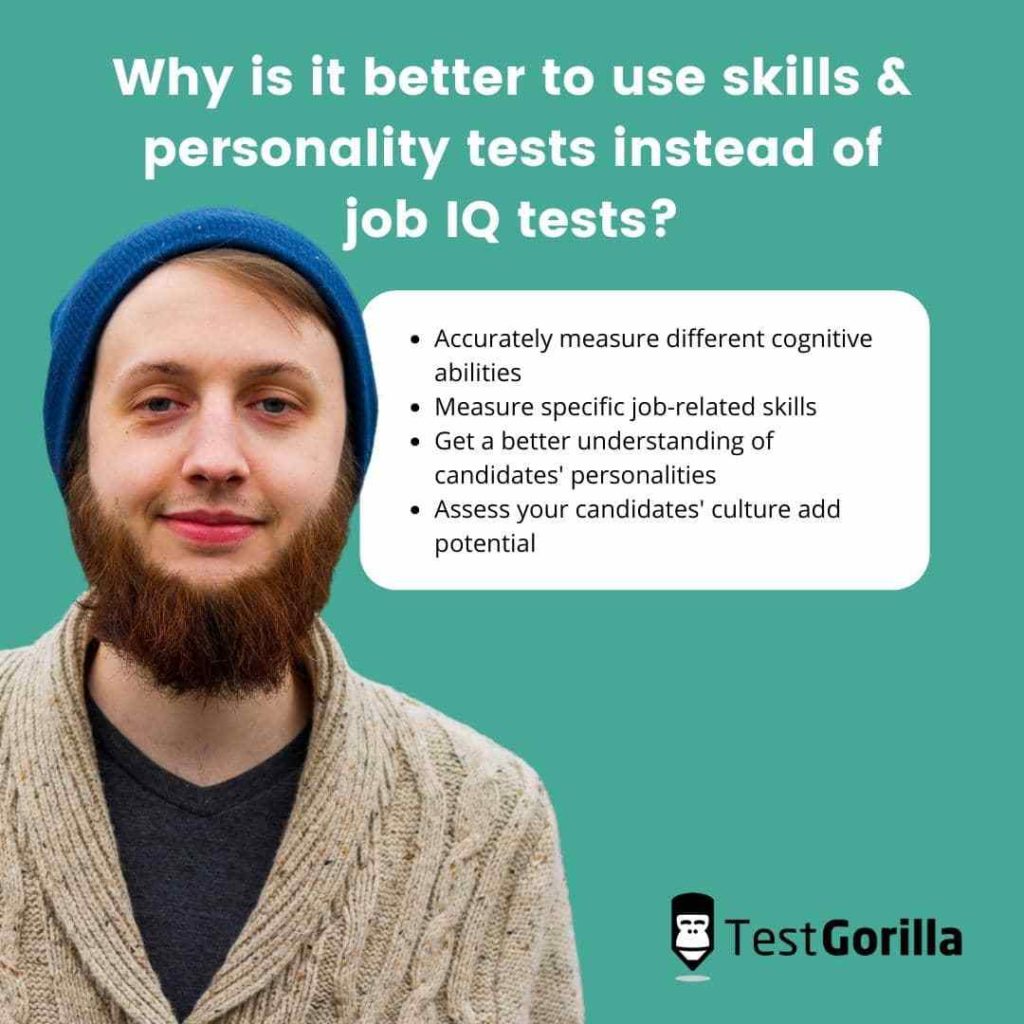Job IQ tests are obsolete: Why we don’t recommend using them for hiring
Most large and medium-sized companies want to get top talent on their team when hiring new personnel. That’s why they opt for IQ testing to sift through all the applicants and pinpoint the sharpest tools in the shed.
However, standardized IQ tests measure general intelligence, which, even if high, might not correlate with better job performance.
Using pre-employment skills tests that help you evaluate specific skills and personality traits might be a better alternative to IQ testing if you want to hire the very best candidates. Keep reading to learn more about IQ testing in hiring and why we don't recommend it.
Table of contents
Can IQ tests be used in hiring?
Yes, they can be. But IQ tests only measure the intelligence of a candidate, rather than their ability to perform well.
The result you get from an IQ test only provides you with a number, which doesn’t paint the whole picture, and doesn’t allow you to decide whether that candidate is the right fit for your company.
This is why IQ testing is mostly becoming an obsolete recruitment strategy. Cognitive aptitude tests, combined with role-specific skills tests and personality and culture tests might be a much better alternative to job IQ tests.
Recommended reading: Understanding the limitations of IQ tests
Are job IQ tests illegal for employment?
It depends. If an organization is using an IQ test for hiring, it’s their responsibility to make sure that the test they’re using is reliable, professionally developed, and provides consistent results that predict job success for this specific role. If they fail to do so, they might face discrimination claims.
Otherwise said, professionally developed pre-employment IQ tests are legal if they’re created for a specific job role but can become discriminatory and potentially illegal if you use the same IQ test for a position that doesn’t require the same knowledge and/or skills, or if they result in a disparate impact on hiring.
For example, in the Griggs v. Duke Power Co. lawsuit from 1971, the Supreme Court ruled that the tests that Duke Power used (The Bennett Mechanical Comprehension Test, a test of mechanical aptitude, and the Wonderlic Cognitive Ability Test, an IQ test), in combination with a high school diploma requirement, disparately impacted ethnic minority groups while they didn’t provide a reasonable measure of job performance.
IQ at a certain level can rarely be considered a defendable job requirement: defending the threshold you set for an IQ test might be nearly impossible. For example, if you set it at 120 for a position and a candidate gets 115, does that make them unqualified even if they get everything else right (at the interview, and at skills tests)?
This is a debatable issue and one that few if any companies can legally defend, which is why using a job IQ test isn’t advisable.
The best insights on HR and recruitment, delivered to your inbox.
Biweekly updates. No spam. Unsubscribe any time.
Does IQ really predict job performance?
Although hiring for smarts can, in some cases, be a successful strategy, IQ alone doesn’t predict job performance.
As already mentioned, with a standardized IQ test you only get a number on a scale, and in this case a scale of intelligence. However, these IQ tests don’t take into account important skills like attention to detail or communication skills, which are essential for any job.
Using a more comprehensive skills assessment (i.e., a set of skills tests) that includes these skills is a much better indicator of job performance.
Indeed, having a high IQ score doesn’t automatically mean better job performance, nor does it mean that a person can become a good leader. This is because smart people that test high on IQ tests are tested on cognitive abilities central to doing well in school, but not in business.
This is where strong critical thinking comes into play, and IQ tests cannot reliably assess someone’s critical thinking capacities.
Why aren’t IQ tests a reliable way to measure job performance?
In short, IQ tests neither measure specific job-related skills, nor personality fit and culture add potential. For this reason, they aren’t a reliable indicator of future job performance.
While IQ testing for employment might give you a general overview of a candidate’s intelligence, it won’t give you insights into how well they might fit into your company.
Again, IQ testing shows you only half the picture: you’ll miss out on knowing what their EQ (emotional intelligence) is, how they would behave in a certain role, how they would manage a stressful or unfamiliar situation, and whether they possess the necessary job-related skills.
This is why pre-employment skills testing is a much better alternative to IQ tests: it allows you to test a candidate’s soft and hard skills, personality fit, and potential for culture add. All these can not only give you an accurate way to evaluate their future job performance, but can also enhance your hiring process by:
Improving your time to hire
Reducing your recruitment costs
Guaranteeing an unbiased selection
Why is it better to use skills & personality tests instead of job IQ tests?
Skills tests can accurately measure cognitive ability and specific job-related skills. Additionally, you can use psychometric tests to test for personality and culture fit.
1. Skills tests can accurately measure different cognitive abilities
As mentioned above, skills tests are a much more efficient way of testing your candidates’ abilities. For that reason, they’re a good alternative to IQ tests in the context of hiring. Cognitive ability tests are a great substitute because, like an IQ test, they measure a person’s intelligence but your insights will be much deeper and multi-layered.
A cognitive ability assessment can feature several specific tests and help you evaluate how a person thinks, including assessing their attention to detail, problem-solving, and critical thinking skills, along with their numerical and spatial reasoning.
TestGorilla offers many cognitive ability tests that will aid you when selecting the best talent out there. The tests are individual 10-minute quizzes that assess specific areas and types of cognitive ability. They’re great when you have specific job requirements that demand precise skills and can also be used in combination with personality tests and role-specific tests.
Using cognitive ability tests can help you accurately predict the job performance of potential employees, as well as their learning abilities and problem-solving skills, regardless of their background or IQ score.
For this reason, cognitive ability tests help you minimize bias, and will save you time and money.
2. Pre-employment tests can also measure specific job-related skills
Evaluating job-related skills allows you to accurately assess candidates’ knowledge and experience in a given field. IQ tests don’t allow for that.
Furthermore, simply looking at someone’s resume doesn’t give you a precise idea of their skills either, especially if you’re hiring globally and are not familiar with their previous workplaces.
That’s why conducting a skills assessment is one of the most crucial elements of your hiring process that will give you a clearer picture of a candidate’s skills and knowledge. You can even do it before the resume review process has started.
Some applicants are not entirely truthful with their resumes and the skills that they possess: according to a Monster survey from 2019, 85% of recruiters find that candidates exaggerate their skills on CVs. This is why assessing specific job-related skills (such as financial accounting (IFRS), UX/UI design, or customer service skills) is essential.
Skills testing will help you eliminate candidates that are completely unqualified for a position, while giving you more time to assess and engage with the best applicants.
TestGorilla has many role-specific skill assessment tests that will speed up your hiring process and make it more objective and reliable.
3. Pre-employment tests allow you to get a better understanding of candidates’ personalities
Personality tests are not the best indicators for job performance if used alone. However, if combined with cognitive ability and skill assessment tests, they can complete the picture determining whether a candidate is the right fit.
You also need to consider the legal ramifications of using such tests, as they can be seen as discriminatory if not done professionally and if they don’t eliminate bias. That’s why TestGorilla offers three personality tests, which:
Give you insights into a person’s behavior, motivators, and world overview
Evaluate their openness, conscientiousness, extroversion, agreeableness, and emotional stability
Assess how they express emotions
These tests are professionally developed and in accordance with what is needed to assess a candidate fairly and without bias.
Personality tests shouldn’t be used to make a hiring decision, but rather to get a better understanding of your candidates’ personality traits and behavior, as well as the factors that motivate them.
4. Pre-employment tests allow you to assess your candidates’ culture add potential
Every company has a culture that it wants to expand upon and hiring candidates that “fit your company’s culture” has been a solid tactic in the past decade.
The idea behind it is that a person who shares your company’s values will be a better fit and thus prove a better employee in the long run. While there may be some merit to this logic, such thinking can encourage hiring bias, while also limiting your company’s growth by not capitalizing on diversity. Having a diverse staff leads to the generation of new ideas that in turn can produce higher profitability.
Instead of thinking about hiring for a culture fit, you should aim to hire for culture add. What this means in practice is hiring people who are different — they think, act, and even look different. Thus, it makes sense to evaluate candidates’ culture add potential rather than focusing only on culture fit.
Diverse teams perform better because differences can complement each other, allowing people to learn more and find new, creative solutions to problems they encounter. In turn, this can relate to higher productivity and profitability for your company in the long run.
It’s difficult to hire for culture add, but it can be done through structured interviews that will help you understand a candidate on a deeper level. Additionally, TestGorilla provides you with an objective Culture Add test that will help assess if a candidate’s values, behaviors, and interests align with your company values.
Job IQ tests cannot help you predict culture add potential in any reliable manner and won’t, therefore, help you hire for diversity.
IQ tests don’t give you the big picture
While IQ tests are only related to “pure” intelligence, job performance is related to many other skills and abilities. Skills assessments allow you to test for multiple skills and traits at once and make an informed, data-driven hiring decision.
Using a combination of cognitive ability tests, role-specific assessments, and personality tests can really help you get a solid understanding of which candidates are best suited for a given role.
Not only that but using a mixture of these tests will help you gauge the candidates’ job performance and what they can add to the company in terms of productivity and culture, bringing in fresh ideas and insights.
All in all, TestGorilla can help you with all these factors by providing professionally developed tests, which will ensure you hire the best talent in the shortest time. Get started today for free.
You've scrolled this far
Why not try TestGorilla for free, and see what happens when you put skills first.
















